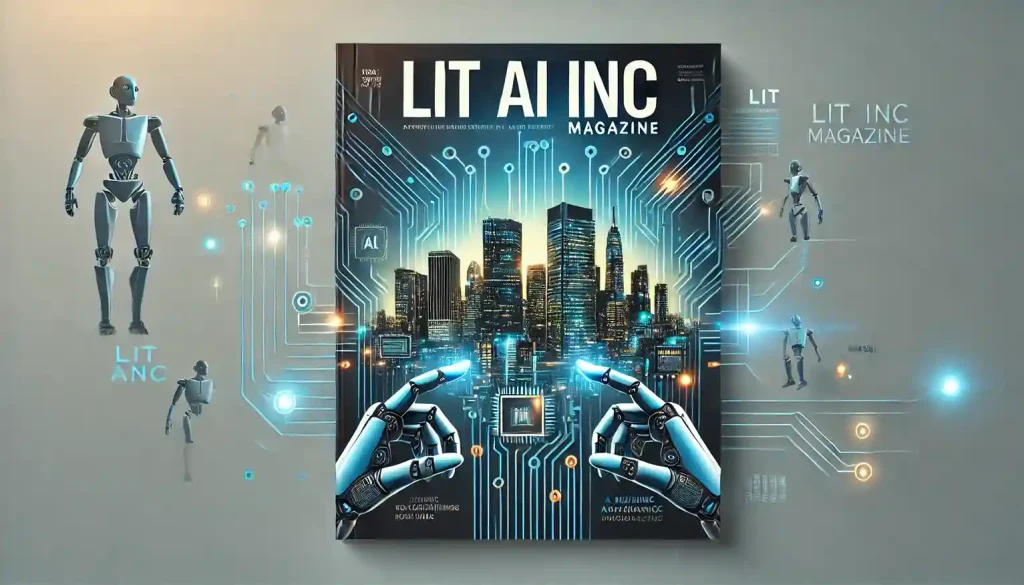In today’s rapidly evolving digital landscape, Lit AI Inc Magazine has emerged as a transformative force in various industries, propelling businesses into new heights of efficiency and innovation. Lit AI Inc Magazine stands at the forefront of this revolution, offering in-depth analysis and reporting on how AI technologies are reshaping the corporate world. This article provides a comprehensive overview of the ways AI is being integrated into business practices to drive growth, enhance customer experiences, and streamline operations.
AI and Its Role in Modern Business Strategy
Artificial intelligence is no longer just a tool for automation; it’s becoming an integral part of strategic planning within businesses. AI’s ability to analyze vast amounts of data and provide actionable insights can significantly enhance decision-making processes, helping companies stay competitive in their respective industries. This section explores how AI is integrated into business strategies to foster growth and innovation.
Enhancing Customer Interaction with AI
AI technologies such as chatbots and virtual assistants are revolutionizing the way businesses interact with their customers. These tools not only improve the efficiency of customer service but also provide a personalized experience to users. This segment discusses the benefits of AI in customer relations and its impact on customer satisfaction and loyalty.
AI-Driven Analytics and Data Interpretation
With the advent of big data, AI’s role in analytics has become a game changer for businesses. AI systems can quickly interpret complex data sets to identify trends, predict market changes, and guide business strategies. This part examines the techniques and tools of AI-driven analytics and how they transform data into valuable insights.
Automating Operations with AI Technologies
Automation is one of the most significant benefits of AI, affecting various aspects of business operations from supply chain management to financial operations. This section delves into how AI is used to automate routine tasks, reduce errors, and increase operational efficiency.
AI in Marketing: Personalization and Engagement
AI is reshaping marketing strategies by enabling hyper-personalization and targeted advertising. This portion of the article looks at how AI tools analyze customer data to tailor marketing efforts and create engaging content that resonates with audiences.
The Impact of AI on Human Resources
AI is also transforming the human resources sector by automating recruitment processes, enhancing employee engagement, and optimizing talent management. This section covers the ways in which AI is being employed in HR to improve both employee and organizational performance.
AI and Cybersecurity: Safeguarding the Future
In the age of digital transactions and data breaches, AI is a critical ally in enhancing cybersecurity measures. This part discusses how AI technologies are being used to detect threats, prevent attacks, and secure sensitive information.
Ethical Considerations in AI Implementation
As AI becomes more pervasive, ethical considerations are increasingly important. This section addresses the ethical challenges associated with AI, such as privacy concerns, bias in AI algorithms, and the implications of autonomous systems.
Future Trends: AI and the Evolution of Industries
Looking forward, this part forecasts how AI will continue to influence and transform various sectors. It provides insights into upcoming trends, innovations, and the potential for AI to solve complex global challenges.
Case Studies: Success Stories of AI in Business
This segment highlights real-world examples of businesses that have successfully integrated AI into their operations, demonstrating the tangible benefits and ROI of AI technologies.
FAQs:
- What is artificial intelligence? Artificial intelligence refers to the simulation of human intelligence in machines designed to think and learn like humans.
- How does AI improve customer service? AI improves customer service by automating responses, providing 24/7 support, and personalizing interactions based on user data.
- Can AI replace human employees? While AI can automate certain tasks, it is generally used to augment human work, allowing employees to focus on more strategic activities.
- What are the risks associated with AI in business? The risks include potential job displacement, privacy issues, and the need for substantial investment in AI technologies.
- How do I integrate AI into my business? Integration typically starts with identifying business processes that can benefit from automation and enhanced analytics, followed by a phased implementation of AI technologies.
- What are the ethical concerns with AI? Ethical concerns include bias in decision-making, privacy breaches, and the lack of transparency in AI algorithms.
- How does AI secure data? AI secures data by enhancing threat detection systems, analyzing security logs in real time, and predicting potential vulnerabilities.
- Can AI help in decision-making? Yes, AI can significantly enhance decision-making by providing data-driven insights and predictive analytics.
- What industries are benefiting the most from AI? Industries such as finance, healthcare, retail, and manufacturing are seeing significant benefits from AI integration.
- What is the future of AI in business? The future of AI includes more advanced analytics, increased automation, and deeper integration into strategic planning.
Conclusion:
As we have explored in this article, the integration of AI into business operations offers numerous benefits, including enhanced efficiency, improved customer service, and more informed decision-making. However, businesses must also navigate the ethical and operational challenges that come with these advanced technologies. By adopting a thoughtful approach to AI implementation, companies can harness its full potential while mitigating risks, ensuring that they not only survive but thrive in the new digital economy.



